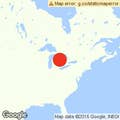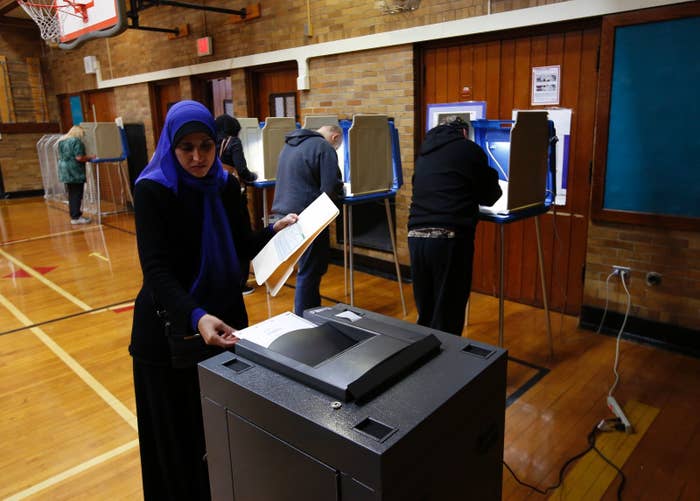
DEARBORN, Michigan — Barely a day after voters across the country, including those in their own state, had voted to elect as president a man who had demonized them and cast suspicion on their patriotism, many Muslim Americans here in Michigan were left asking one question Wednesday: Where do we go from here?
All along Warren Avenue in Dearborn, where many Arab-American small businesses are located, the mood was one of shock and confusion, as people quietly processed the stunning result of the election.
“Today is like a dream,” Mohammad Halabi told BuzzFeed News as he left the New Yaseem Bakery, a popular local shop. “A not-so-good dream."
Although the result was still unofficial, the Detroit Free Press reported Wednesday afternoon that Donald Trump had won Michigan by roughly 13,000 votes. The last time this state had gone to a Republican nominee for president was 1988 for George H.W. Bush.
Back then, Muslim American voters, by and large, used to lean Republican — due, in part, to the party’s stance of social issues, an economic emphasis on entrepreneurship, and support for defeating the Soviets and their invasion of Afghanistan during the Cold War.
Even as recently as 2000, an estimated 72% of Muslim Americans voted for George W. Bush. During that election campaign, in an unprecedented move, Bush visited Dearborn to court the Arab-American vote.
But then the terrorist attacks on Sept. 11, 2001, occurred. After the subsequent wars in Iraq and Afghanistan, and the covert and overt suspicion of the Muslim American population, including the surveillance of mosques and individuals, the Muslim American vote shifted toward left toward the Democrats.
Since then, groups like the Michigan Muslim Community Council, an umbrella organization for all mosques and community leaders across Michigan for the past 30 years, have worked hard to keep this state's Muslim American population politically engaged.
Dr. Muzammil Ahmed, the group's chairman, told BuzzFeed News he viewed this election as an opportunity to keep building on the momentum of the last 19 months.
“We’re not totally dismayed by this election. I think we made a mark in that we’re laying the ground operation for the next four years,” Ahmed said. “We know that we have to work harder to be successful and we’re not going down without a fight. We have a lot of fight in us.”
Ahmed was also celebrating that a 26-year-old Lebanese-American, Abdullah Hammoud, who was born and raised in Dearborn, won a state House seat in Michigan during Tuesday's election. Ilhan Omar also made history last night, winning a Minnesota House seat, making her the first Somali-American to serve in such a position in the nation.
But Ahmed also acknowledged that in the short term, he fears for the younger Muslims in the country: “I think that some bigot might be empowered, might be able to say and do things that might be dangerous, but we’re going to encourage people to stay hopeful.
"The country has been through far worse," he said.
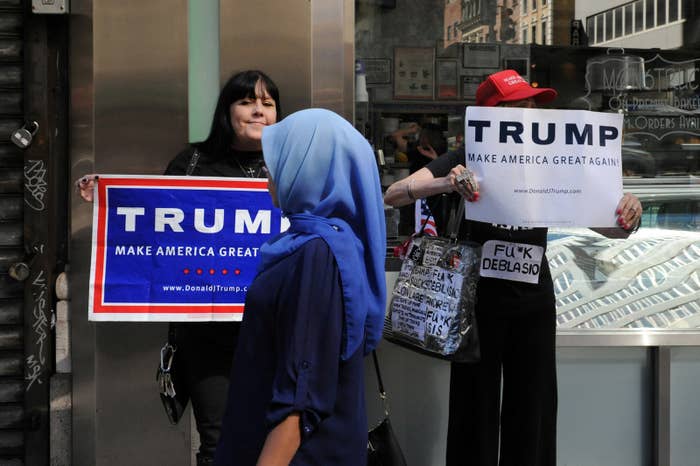
Speaking to BuzzFeed News, roughly two dozen Muslim Americans here said their post–Election Day concerns vary: Some fear extra suspicion from local and federal law enforcement agencies; others worry about the safety of young Muslim Americans at school, and the bullying and alienation that comes with being a young Muslim American today. (A recent study by the Council on American-Islamic Relations in California found that 55% of Muslim American students in that state had experienced some form of bullying based on their religion — a figure that is twice the national average found by the US Department of Health and Human Services.)
Another chief concern was unique to Muslim women, particularly those who wear the hijab and are therefore more easily identifiable as a practitioner of their faith. After Trump's win, many began taking to social media to share their apprehension about the safety of wearing the hijab.
At least one woman, though, defiantly declared that she would begin wearing hijab in public beginning Jan. 20 next year — the day Trump is sworn in as president. After all, as Lisa Shanklin wrote on Facebook, it was Trump's derision of Muslims that had steered her toward Islam in the first place.
"Trump won't need to give me a badge to wear," she wrote. "I will PROUDLY wear hijab and I will call people out on their bigotry of all kinds privately and publicly!"
Then there is, of course, the concern about how President-elect Trump will proceed with his proposal to ban all foreign Muslims from entering the US, later revised to some vague form of "extreme vetting." Like many large immigrant communities, Muslim Americans still have many relatives abroad, and worry that Trump's policies might restrict their visitation.
Finally, there is the ever-present fear of attacks on mosques and on Muslim Americans themselves. A report from earlier this year by Georgetown’s Bridge Initiative, a program dedicated to studying Islamophobia, found that there were more “incidences of anti-Muslim violence and vandalism” in 2015 than any other year since 9/11, according to FBI hate crime statistics.
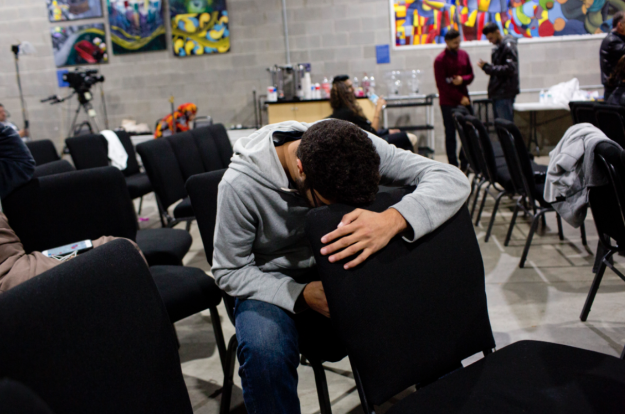
Yet despite all these concerns, nearly all the Muslim and Arab Americans here who spoke with BuzzFeed News on Wednesday vowed that they will move forward and continue to organize.
“We go on with our lives. We have a new president, and I guess it will be a ‘wait and see’ issue,” said Kassem Allie, the executive administrator of Dearborn's Islamic Center of America, the largest mosque in the country.
“There are those in our community that believe that a lot of rhetoric that was spewed didn't have much substance behind it and it was just rhetoric. And there are others that believe [Trump] meant what he said," Allie said.
"But we can’t be anything but optimistic. God willing will give him the benefit of the doubt. His actions will speak for themselves,” he said.
Online, dozens of Muslim women chose to listen to a video livestream titled "Keep Calm and Muslim On," in which an Islamic scholar laid out a path forward. Minnesota activist Anse Tamara Gray, who founded a forum for women scholars of Islam, encouraged listeners to become engaged in local issues.
"We need to embrace our neighbors — even those with the Trump signs," Gray said, arguing it was essential to understand the reasons that motivated large swaths of the country to vote for the president-elect.
Gray also encouraged the community to become active in local affairs: "Choose your issues and get busy," she said.
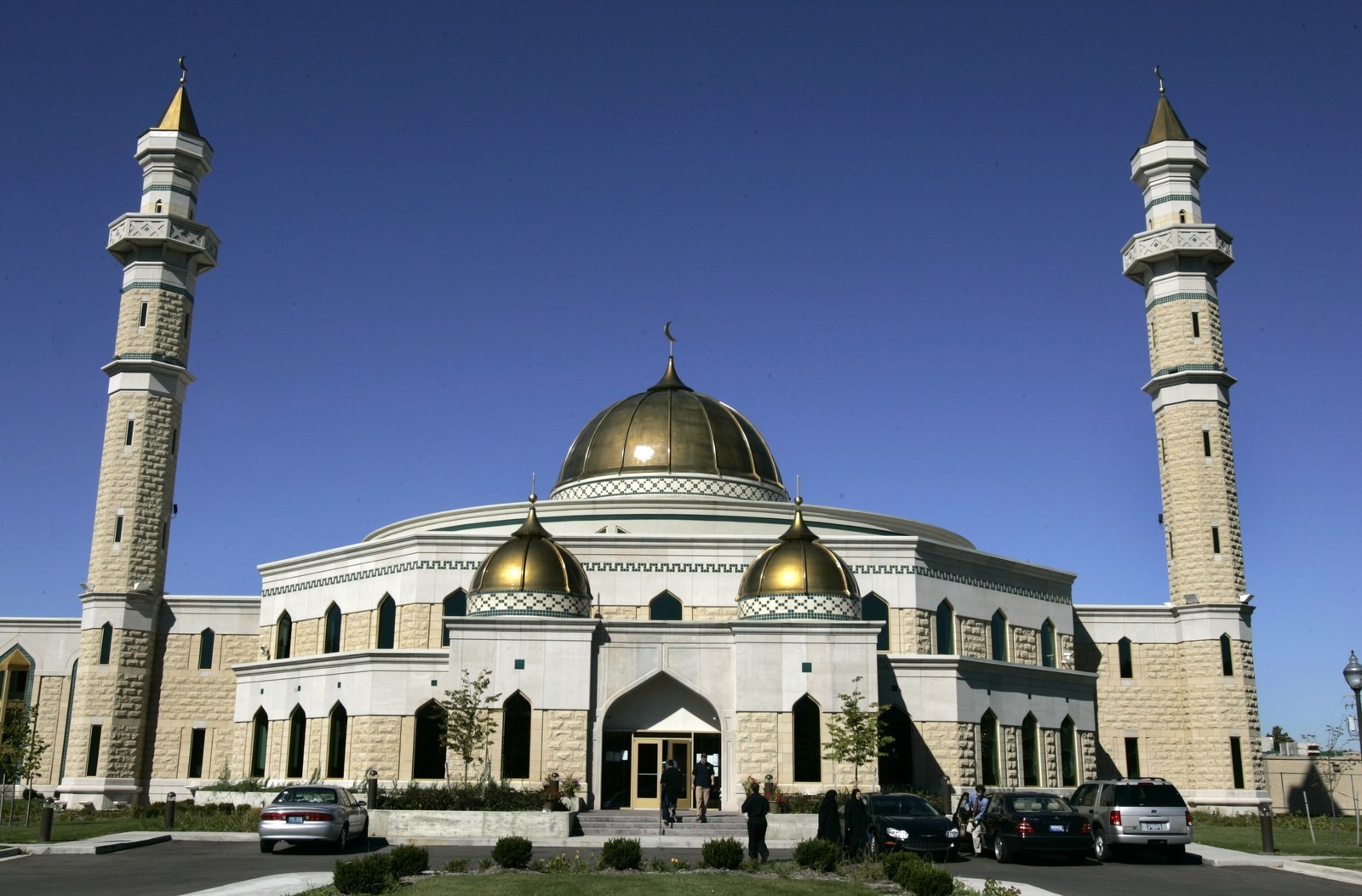
At a press conference in Washington, DC, Nihad Awad, the executive director of the Council on American-Islamic Relations (CAIR), spoke in tones both conciliatory and defiant.
“As citizens of this great nation, we accept the result of the democratic process that has bound us together as one nation,” Awad said. “Regardless of who won yesterday’s election, American Muslims are here to stay. We are not going anywhere, and we will not be intimidated or marginalized."
Answering questions from reporters, Awad said that Trump’s camp had not yet reached out to his group, which is one of the most prominent Muslim civil rights organizations in the country. CAIR is a principal antagonist of the organized anti-Islam lobby in the United States, which has strong ties to Trump.
Nevertheless, Awad said he expected Trump to reach out eventually: “This is a serious wound in our society, and no one can heal it but the one who made that threat."
Unapologetically Muslim All day. Every Day
Elsewhere in the country, Muslim activists expressed dueling sentiments: a renewed sense of mission, combined with a sharp fear of what’s to come.
In New York City, Linda Sarsour, a civil rights activist and leader of the Arab American Association of New York, said she was apprehensive about the possibility that Trump might appoint harsh law-and-order figures hostile to Muslims to powerful positions.
“The reality is we have someone like Rudy Giuliani who could be the next attorney general,” she said. “He’s a man who has unapologetically, outwardly vilified Muslims. He’s going to crack down on everybody who he thinks is out of line. And he knows me by name.”
Nevertheless, Sarsour said, “I have a responsibility to stay positive. I’m more determined than I ever was."
In Phoenix, Imraan Siddiqi, head of the CAIR chapter there, vowed he and his group would double down on their work.
“We’ve gotta get out there and be in front of this and uplift our community,” he said. “If people are targeted, or there are issues with refugees being denied their rights or being harassed, we’ll be out there on the front lines fighting.”
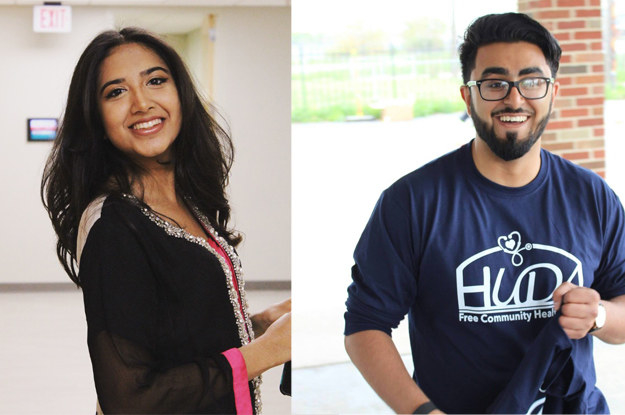
Back in Dearborn, young Muslim Americans had no problem seeing beyond last night’s election — and seeing a path ahead.
Iman Siddiqui, a 20-year-old student at Wayne State University, said she was in “shock” last night, but received encouraging text messages from her white, black, and Latino friends after Trump’s victory appeared inevitable.
On moving forward, Siddiqui echoed a sentiment shared by many Muslim Americans here: the need for coalition-building with other minorities and marginalized groups.
“If we have support of the African-Americans, Latinos, if we have the LGBT community, I think if we all stuck together, I think that will be most impactful moving forward,” Siddiqui said.
Shaffwan Ahmed, 27, also said he supported a movement with the potential to amplify the power of other groups.
“We need to fight for the rights of others, not just ourselves. We need to team up with other communities, especially those that Donald Trump insulted; black, Latino, the disabled,” said Ahmed.
“There are many people that also need our support, and we need them as well," he said.
Talal Ansari reported from Dearborn, Michigan, and David Noriega from Los Angeles. Nidhi Subbaraman also contributed reporting from Washington, DC.


